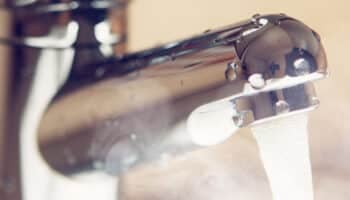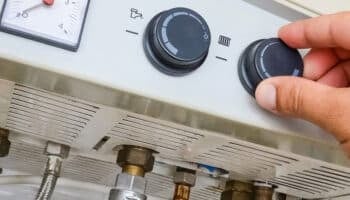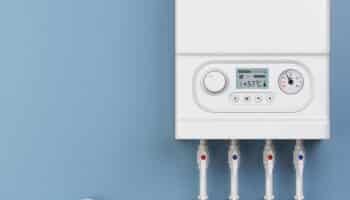We've independently reviewed this article to make sure it's as accurate as we can make it.
To find out more about our article creation and review process, check out our editorial guidelines.
There’s nothing as glorious as a hot shower on a cold sleepy morning, or after a long, stressful day at work.
But have you ever had your hopes for a steamy, relaxing shower met with utter disappointment as you shivered under lukewarm water?
If this is a common occurrence, it’s not just a fluke — there actually may be something amiss with your home’s hot water system.
How can you tell? Why does your hot water take ages to warm up, anyway?
In this article, we’ll explore all the possible reasons why your hot water takes a long time to heat up. With solutions to putting an end to tepid showers and chilly faucet water, once and for all.
Let’s get started!
Reasons Why Your Hot Water Takes a Long Time to Heat Up
There are a handful of problems and factors that can affect your system’s ability to produce hot water.
Depending on your unique situation, you may be experiencing one or more of the following issues:
Blown Fuse or No Gas
Both gas and electric water heaters are susceptible to the occasional faulty part. When something goes awry with the main components of these units, it can affect their ability to produce an adequate supply of water to your entire home.
Do you have a gas water heater? If your gas water heater isn’t producing hot water at all, the pilot light may have gone out, or the unit is out of gas. There could also be a clogged flame sensor that needs cleaning, or the electronic ignition may only produce a faint light (or none at all) even when it’s receiving electricity.
For an electric water heater, a tripped circuit breaker or blown fuse may be to blame. These issues can also arise with tankless propane water heaters and electric tankless water heaters.
Old Water Heater
Is your water heater more than a decade old? Your water heater may not be producing an adequate supply of hot water because it is approaching the end of its lifetime.
If your water heater is more than eight years old or has significant wear-and-tear, this could also be why your hot water takes a long time to heat up ‒ or not at all.
Faulty Heating Element
Does your water run hot only for a short amount of time? Do your shower or water fixtures only release lukewarm water?
Electric water heaters feature a set of upper and lower heating elements, and when these no longer work properly, they can disrupt your supply of hot water.
How do you know which heating element is faulty?
No hot water & constant supply of lukewarm water = a malfunctioning upper heating element.
A small amount of hot water that quickly turns cold = a malfunctioning lower heating element.
Luckily, a faulty heating element is rarely a cause for concern. Replacing the defective heating element is relatively easy to do and usually doesn’t require replacing the water heating unit entirely.
Thermostat
Attached to the upper and lower heating elements are thermostats, which control the temperature of the water that the heating elements produce. While the thermostats don’t malfunction as frequently as their adjoining heating elements, they do require testing every time your system stops producing hot water.
No hot water = a faulty upper thermostat.
A small amount of water that quickly goes cold = a faulty lower thermostat.
By the same token, water that is too hot can also indicate a problem with an electric water heater’s thermostat.
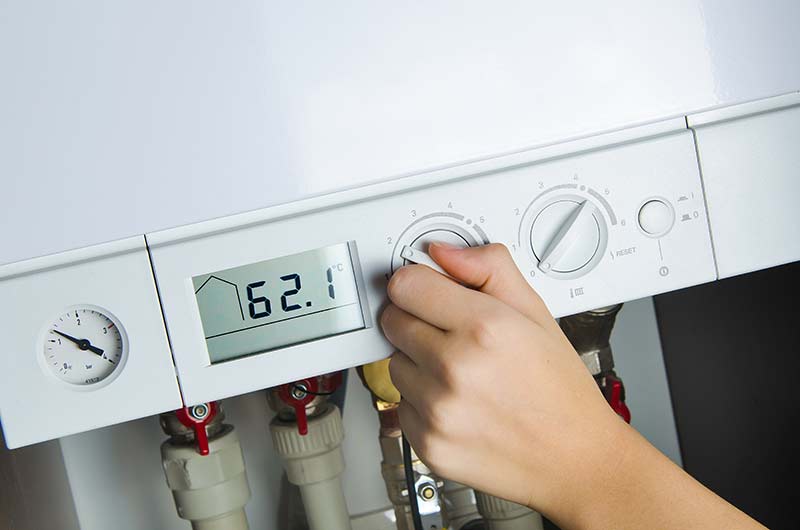
When checking the thermostat, it’s a good idea to check whether your meter and main shutoff valves are only partially open. If the valves are open, a malfunctioning thermostat is likely the issue, more often than not, and it may require replacing.
Distance
The greater the distance between your hot water tank and your shower or faucet, the longer it will take for the hot water to arrive.
So if your shower or kitchen sink are at one end of the house and your water heater is on the other, this could be partially why your hot water takes ages to warm up.
Small Water Heater
Has your family grown since you had your current water heater installed? Your water heater may be too small to accommodate your household’s demand for hot water.
You may want to consider upgrading to a larger unit or a tankless water heater. We’ll explore how to select the right tank capacity later on in this article.
Low Water Pressure
A loss in water pressure can disrupt your water heater’s performance ‒ and there’s no shortage of reasons for low water pressure. In fact, lower water pressure can be due to any of the following:
- A partially closed meter valve
- A partially closed main shutoff valve
- Old pipes
- Faulty pressure regulator
Your plumbing fixtures and faucets may have low volume restrictors. These disk-shaped barriers can also affect your water pressure and slow down the flow of hot water through your tap fixtures.
Sediment Buildup
Was your water heater installed within the last couple of years but doesn’t seem to be heating water as quickly as when you first had it installed? There may be a build-up of sediment at the bottom of your hot water tank that is long overdue for a cleaning.
Over time, dissolved minerals will settle and collect at the bottom of the tank. In most tanks, sediment will build up near the gas burner or electric heater. The sediment can block the transfer of heat.
How Long Should It Take for Water to Heat Up?
Traditionally, electric heaters take longer to heat water than gas units. On average, most water heaters take an hour to recover, but many factors can shorten or extend this amount of time.
Recovery times vary from unit to unit. Recovery time refers to the amount of time it takes for a unit to deliver and restore its supply of hot water after it has run out.
Every hot water tank has what’s known as a first-hour rating (FHR). The FHR measures how much hot water a unit can produce in an hour when it is on. Units with high FHR heat a higher supply of water per hour.
[Rule of thumb: The higher the FHR, the more hot water it can supply in a shorter amount of time. But keep in mind that a larger tank will take longer to recover and may have a lower FHR value.]
Colder weather can also affect your water heater’s performance. Cold underground air can cool down the water and make it harder for your water heater to heat it effectively. This is especially common in regions that experience heavy snowfall and subzero temperatures during the wintertime.
What Is the Lifetime for a Tank or Tankless Water Heater?
If you’re in the market for a new water heater, whether tankless or with a traditional tank, you may be wondering: How long does a water heater usually last? How can I invest in the right unit and extend its longevity?
The average lifetime of a gas or electric water tank can range anywhere from eight to 15 years. Electric tanks tend to last longer than gas units. Tankless units can last up to 20 years! You can learn more about the varying lifespans of tanked vs tankless water heaters in this article.
How Can You Get Hot Water Faster?
Did you know that your water heating system makes up 18% of your home’s total energy usage?
If you’re constantly having to wait for your shower or kitchen faucet to produce hot water, you could be wasting energy and increasing your monthly bills. Your shower may even experience constant temperature fluctuations.
By optimizing your home’s water heater system, you can minimize wasted energy, improve your home’s hot water supply, all while cutting down on your monthly energy bills.
So, what are some ways you can get hot water faster and improve your energy-efficiency? Let’s take a look:
Install a New Unit
Selecting the right tank capacity is essential. Hot water tanks accommodate a range of gallon sizes, and your tank specifically should the number of people in your household.
Generally speaking, a household of one to two people requires a tank capacity of anywhere from 20 to 40 gallons. A household with more than four people will begin to require a tank capacity of more than 50 gallons, and this figure can increase depending on much hot water each individual relies on.
Here’s a breakdown of how to calculate the amount of hot water required with a 36-gallon unit:
If you’re having trouble deciding between gas vs electric water heaters, we explore the benefits, performance, and durability of both in this article!
Install a Tankless Hot Water System
Tankless systems don’t store hot water like traditional tanks. Rather, a tankless system, whether powered by electricity or gas, utilizes a heating element, turning water hot and delivering it instantaneously.
A gas or electric tankless system is not necessarily better than the other. If energy-efficiency is the main concern of yours, you may find yourself leaning more towards an electric tankless unit. However, that doesn’t mean you can’t have energy efficiency with a gas tankless unit!
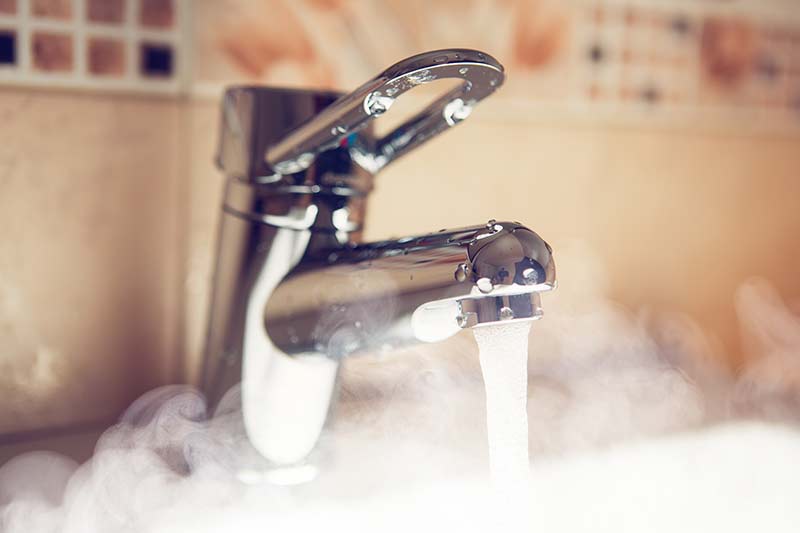
Because tankless systems deliver hot water only when you turn your shower on or use your water fixtures, they both use up less energy and heat, which can lead to lower energy and heating bills every month.
Install a Hot Water Recirculation System
Attaching a recirculation system to your water heater can also quicken the delivery time of hot water AND improve your energy efficiency.
Activated by a timer or thermostat, a recirculation system pumps water more quickly from the heater to the fixture and recirculates used water back to the heater. This process reduces the amount of water wasted while you wait for your shower or water fixture to deliver hot water.
Is It Better to Leave Hot Water on All the Time?
Contrary to popular belief, it is not better to leave the hot water on all the time. Not only is it recommended to turn your hot water supply on and off when needed, but it is also recommended that you keep your water heater’s thermostat down to avoid scalding hot water.
Why is this?
By leaving the hot water on all the time, you may be burning up energy and increasing your energy bills.
Most appliances are capable of heating cold water, reducing the need to have a supply of hot water ready at a moment’s notice. If you plan to take a long hot shower or bath, turn the water heater on an hour beforehand.
Insulate Your Hot Water Heater & Water Pipes
A hot water tank with proper insulation can keep water hot throughout the day and reduce the need to keep your unit on all the time.
Homeowners can also insulate their home’s water pipes to maintain the temperature of hot water as it travels from a heating unit to the plumbing fixtures. Insulated pipes can even increase the water’s temperature by 2°F-4°F, allowing homeowners to keep their thermostats at lower temperatures.
Should You Turn Your Water Heater’s Thermostat Up in the Winter?
Because underground air is colder in the wintertime, it seemingly makes sense to keep the thermostat up on your water heater. However, doing so can waste more energy and increase the risk of producing scalding, injury-inducing hot water.
In the wintertime, you can adjust your water heater’s thermostat by 5°F to 10°F and see if it provides an ample and desired supply of hot water.
By insulating your water heater, your home’s water pipes, and only turning your hot water on when needed, you can maintain slightly higher temperatures in the wintertime without racking up your energy bills.
Understanding How to Maintain Hot Water in Your Home
When you want to take a hot shower or wash the dishes with warm water, you shouldn’t have to wait or suffer through lukewarm to icy cold water.
There are all types of reasons why our hot water takes ages to warm up ‒ but there are a variety of solutions to improving your water heater’s performance, maintaining your home’s supply of hot water, and enhancing your energy efficiency in the process.
If you would like to learn more about water heaters, how to extend the lifetime of your investment, and adopt more energy-efficient practices, stay tuned to our blog!






